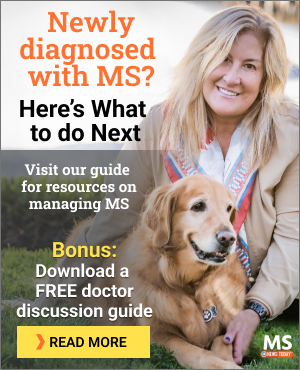High acceptability, participant engagement seen with ‘MHealth’ intervention
by |
Sending SMS text messages to people with multiple sclerosis (MS) — with tips for fatigue self-management and to regularly check in on them — may be a feasible, acceptable, and engaging tool to help these patients manage disease-related fatigue, according to a pilot study.
The findings also showed some small but promising effects on sleep, as well as on patients’ self-efficacy in managing symptoms and in their social participation.
“This project supports further study of MHealth [mobile health] strategies to improve health outcomes in various populations, such as individuals with MS,” the researchers wrote.
The study, “Text messaging intervention for fatigue self-management in people with stroke, spinal cord injury, and multiple sclerosis: A pilot study,” was published in the Disability and Health Journal.
Fatigue, marked by prolonged periods of exhaustion and the inability to perform expected activities, is about 2-3 times more common in people with disabilities than in the general population. In MS, this is a common symptom, affecting about 80% of patients, and has a significant impact on the individual’s quality of life.
While some medications may help ease fatigue, most have limited efficacy and cause undesirable side effects. As a result, patients have ben turning more and more to other treatment approaches, such as exercise, education, and behavioral management techniques.
However, according to scientists, “there is a lack of consensus across research and clinical practitioners on the most effective approach for fatigue management for [people with disabilities].”
Mobile health, or MHealth, platforms have become effective and accessible tools for providing care and health interventions — including supporting self-management in people with disabilities.
SMS-based interventions, in particular, have been shown to induce some changes in behavior in the person’s own environment, leading to significant improvements in self-management of symptoms and, ultimately, in health outcomes.
Researchers in the U.S. previously developed an SMS-based fatigue self-management intervention for people with MS and other neurological conditions. In this study, they examined the acceptability and feasibility of the intervention over a 12-week period. The team also evaluated whether patients engaged with the text messages and experienced any improvements in their symptoms.
The intervention consisted of four weekly educational SMS text messages, sent from Monday through Thursday morning each week. The messages provided some self-management tips in nine focus areas, including fatigue education and awareness, behavioral techniques, and energy conservation. The remaining focus areas were environment and assistive technology, simplifying activities, diet/hydration, effective communication, physical activity, and sleep.
In addition to the educational text messages, participants also received two weekly check-in messages on Friday that asked them about their fatigue levels over the previous week, and whether they had applied any of the tips from that week’s SMS text messages.
The study included 27 people with disabilities living in a U.S. Midwestern city — nine had MS, nine had spinal cord injury, and nine stroke. All were experiencing fatigue that impacted their daily lives.
Nearly two-thirds of the participants (63%) were women (63%); the mean age was 49.7. Before and after the intervention, the participants completed a number of health assessments, and a satisfaction questionnaire also was handed out after the intervention.
Overall, 25 patients (93%) completed the full study, with an SMS response rate of 85.2%. MS participants had the highest response rate — 96.8% — suggesting a high acceptability and adherence to the intervention.
Most patients (92%) reported being “very” or “mostly” satisfied with the intervention, and 92% would recommend it to a friend. Also, around 88% said the intervention helped them more effectively cope with their problems, and 84% believed the program was of “excellent” or “good quality.” Finally, 87.5% indicated they would participate again, supporting the intervention’s acceptability.
Regarding health outcomes, the intervention had a moderate effects on two measures of fatigue, and it also improved sleep and patients’ satisfaction with participation in social activities. There also was a small effect on self-efficacy in managing symptoms.
This study provides initial feasibility and health outcome change evidence to support an SMS text messaging intervention to manage fatigue in [people with disabilities].
This study provides initial feasibility and health outcome change evidence to support an SMS text messaging intervention to manage fatigue in [people with disabilities].
There was no effect, however, on patient activation — defined as having the knowledge, skills, and confidence to manage their health.
In a qualitative analysis of the program, 15 participants considered it helpful and informative, and two said they were motivated by the messages. As strengths of the intervention, seven participants indicated its simplicity and accessibility, and five considered that the consistency and repetition of the messages throughout the week reinforced positive behavior changes.
Regarding the program weaknesses, four patients indicated that some contents overlapped too greatly, and three patients preferred more action-oriented content tailored to their disability.
“This study provides initial feasibility and health outcome change evidence to support an SMS text messaging intervention to manage fatigue in [people with disabilities],” the researchers wrote.
According to the team, future trials testing the intervention’s efficacy should include appropriate controls and a larger number of participants.
Get regular updates to your inbox.
3 W Garden St
Suite 700
Pensacola, FL 32502
Website: bionews.com
Email: [email protected]
Phone: 1-800-936-1363
This site is strictly a news and information website about the disease. It does not provide medical advice, diagnosis or treatment. This content is not intended to be a substitute for professional medical advice, diagnosis, or treatment. Always seek the advice of your physician or other qualified health provider with any questions you may have regarding a medical condition. Never disregard professional medical advice or delay in seeking it because of something you have read on this website.

